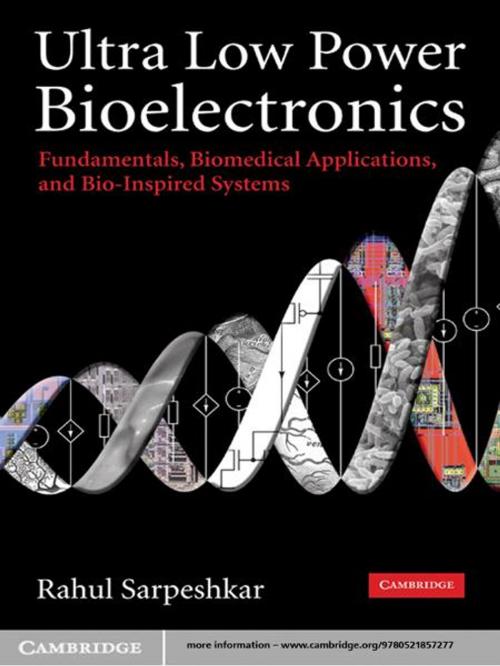Ultra Low Power Bioelectronics
Fundamentals, Biomedical Applications, and Bio-Inspired Systems
Nonfiction, Science & Nature, Technology, Electronics, Circuits| Author: | Rahul Sarpeshkar | ISBN: | 9780511861789 |
| Publisher: | Cambridge University Press | Publication: | February 22, 2010 |
| Imprint: | Cambridge University Press | Language: | English |
| Author: | Rahul Sarpeshkar |
| ISBN: | 9780511861789 |
| Publisher: | Cambridge University Press |
| Publication: | February 22, 2010 |
| Imprint: | Cambridge University Press |
| Language: | English |
This book provides, for the first time, a broad and deep treatment of the fields of both ultra low power electronics and bioelectronics. It discusses fundamental principles and circuits for ultra low power electronic design and their applications in biomedical systems. It also discusses how ultra energy efficient cellular and neural systems in biology can inspire revolutionary low power architectures in mixed-signal and RF electronics. The book presents a unique, unifying view of ultra low power analog and digital electronics and emphasizes the use of the ultra energy efficient subthreshold regime of transistor operation in both. Chapters on batteries, energy harvesting, and the future of energy provide an understanding of fundamental relationships between energy use and energy generation at small scales and at large scales. A wealth of insights and examples from brain implants, cochlear implants, bio-molecular sensing, cardiac devices, and bio-inspired systems make the book useful and engaging for students and practicing engineers.
This book provides, for the first time, a broad and deep treatment of the fields of both ultra low power electronics and bioelectronics. It discusses fundamental principles and circuits for ultra low power electronic design and their applications in biomedical systems. It also discusses how ultra energy efficient cellular and neural systems in biology can inspire revolutionary low power architectures in mixed-signal and RF electronics. The book presents a unique, unifying view of ultra low power analog and digital electronics and emphasizes the use of the ultra energy efficient subthreshold regime of transistor operation in both. Chapters on batteries, energy harvesting, and the future of energy provide an understanding of fundamental relationships between energy use and energy generation at small scales and at large scales. A wealth of insights and examples from brain implants, cochlear implants, bio-molecular sensing, cardiac devices, and bio-inspired systems make the book useful and engaging for students and practicing engineers.















